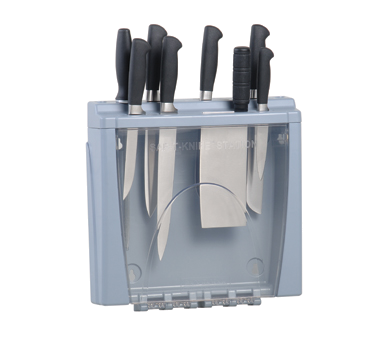Kitchen knives are some of the most important food prep tools in your kitchen. The purchase of a quality kitchen knife should be seen as an investment, not an expense. Proper care and use of these knives can make all the difference in how the blade performs and how long they will last.
Proper Storage: Your knives should be stored in a safe place that will protect the cutting edge from damage and will guard against injuries. The most popular and suitable way to store your knives is in a sanitary wall mount storage rack, such as the one pictured to the right. You can also store them in a knife block, wooden in-drawer knife trays, on magnetic wall mounts, or in a cutlery case. Blade guards are highly recommended when storing your knives in drawers.
Cleaning: Carbon steel knives will rust, to avoid this as much as possible they need to be washed and dried immediately after use. You should not allow acidic foods, such as tomatoes and lemons, to remain on the blade after use. This will increase the chances of your knives rusting. If your knives do rust you can use a non-abrasive metal polish to clean it. You should avoid using automatic dishwashers to clean any of your quality knives. This can cause the blade to dull from rubbing against other hard objects and some detergents can cause pitting of the blade. You always want to hand wash your knives in mild to medium strength detergent and towel dry from the back of the knife, then store in a well-ventilated area.
Proper Use: When using your knife you should always use a proper cutting surface. Wood or poly-ethylene are the best choices in cutting board materials. You never want to cut on tough surfaces that will not “give” with the edge of your knives such as acrylic or ceramic. Also, you should never use your knives as screwdrivers or can openers. This will result in the irreparable bending or breaking of the blade.
Sharpening: Your knife will dull from everyday use, keeping a knife sharp is very important. A dull knife is a dangerous knife. When a knife starts to dull it takes more force to cut with which increases the chance of the knife slipping in your hand. If your knife is not sharp it will cause your hand to tire quickly, increasing the risk of repetitive motion injury.
If you follow these suggestions your quality kitchen knives will last you a lifetime. Keep your edge.


